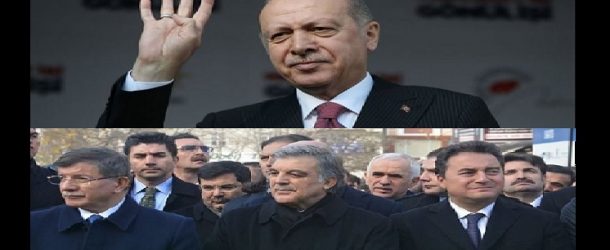As Turkey’s economic problems deepen with the ongoing recession and the volatility in Turkish lira[1], dissatisfaction with the current political system increases both at the mass and political elite levels in the country. After securing a comfortable victory in the 2018 Presidential election against CHP’s Muharrem İnce[2], AK Parti chair and President Recep Tayyip Erdoğan is now in difficult situation. Erdoğan has been able to keep its electoral alliance (Cumhur İttifakı) with the Turkish nationalist MHP solid until now; but this costs him loosing Kurdish votes and having more conflictual relations with other countries. It is not surprising that Erdoğan and his party lost a lot of votes and many municipalities in the March 31, 2019 local elections.[3] The negative trend was accelerated with the annulment of Istanbul’s local election. In the repeated election, on June 23, 2019, CHP’s mayoral candidate Ekrem İmamoğlu had an easier victory against AK Parti’s Binali Yıldırım.[4] In addition to economic and foreign policy problems, nowadays President Erdoğan has to face with domestic political problems as well such as new political party initiatives organized by his former Ministers and close associates including the previous President of the Republic Abdullah Gül, former Prime Minister and Minister of Foreign Affairs Ahmet Davutoğlu and former Economy Minister Ali Babacan. In this piece, I am going to explain recent political developments in Turkey in relation to new political party initiatives.
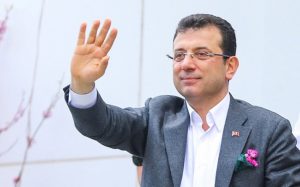
Ekrem İmamoğlu might be a tough candidate against Erdoğan in the next Presidential election
Due to rising reactions against the Islamist and authoritarian practices of the government and the new Executive Presidential (Executive Presidency) system (Cumhurbaşkanlığı hükümet sistemi), in fact two new political party initiatives are taking place simultaneously within the AK Parti right now. The first political party initiative is organized by Turkey’s former Minister of Foreign Affairs (2009-2014) and Prime Minister (2014-2016) Mr. Ahmet Davutoğlu (60). Davutoğlu was known as one of the leading thinkers of new generation of Islamists in Turkey in the 1990s. He worked in International Islamic University Malaysia and taught Political Science. He later returned to Turkey and taught at Istanbul universities such as Marmara University and Beykent University. He also wrote in Turkish daily Yeni Şafak. He published his chef d’oeuvre Strategic Depth (Stratejik Derinlik) in 2001. With this work, he became one of the earliest geopolitical thinkers of Turkey. He advocated a more ambitious and more Islamist foreign policy strategy for Turkey in order to become a regional power. Thus, he was often called as “Neo-Ottomanist” or “Neo-Ottoman” (Yeni Osmanlıcı) although he never accepted this labeling.[5] He became an influential advisor to then-Prime Minister Erdoğan after AK Parti came to power in 2002. In 2007, The Economist called him as “an eminence grise”[6] due to his heavy influence over governmental decisions. He was the architect and mastermind of Turkey’s “zero problems with neighbors” (komşularla sıfır sorun) strategy in the early AK Parti government years. In 2009, he became Turkey’s Minister of Foreign Affairs. He tried to mediate United States and Islamic Republic of Iran -together with Brazil- on Iran’s nuclear (uranium enrichment) program. Although he was the one who established Turkey’s peaceful relations with its neighbors, due to strong waves of the Arab Spring, he later had to change his political stance and began to act together with Western powers against autocratic leaders such as Egypt’s Hosni Mubarak and Syria’s Bashar al Assad. During the Syrian civil war, at the beginning, he became a more influential political figure and Turkey’s new Prime Minister in 2014. Together with President Erdoğan, he published Turkey’s first letter of condolence to Armenia for the 1915 events in 2014.[7] He supported Turkey’s bid for European Union membership and made a deal with the EU concerning the situation of Syrian migrants. He also supported peace negotiations in Cyprus. However, due to Russian intervention into Syria in 2015 as well as the emergence of ISIS, Turkey’s foreign policy towards Syria became a matter of harsh international critics after 2015. Thus, Davutoğlu had to resign in 2016 and was replaced by Binali Yıldırım.
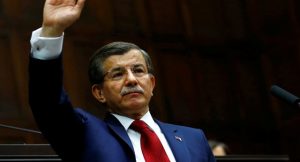
Ahmet Davutoğlu will soon establish his new political party
After his resignation, Davutoğlu returned to academia. He taught International Relations courses in Japan and continued to think and write. He also made preparations for his new political initiative. On April 22, 2019, he published his first 15 pages manifesto in order to criticize the current political system.[8] After this manifesto, Turkish and international press began to publish news about his political actions by underlining his intention to establish a new (right-wing conservative) political party.[9] Few days ago, he made a speech in Elazığ and clearly showed his intention to set up a new political party by criticizing President Erdoğan’s policies.[10] Although Davutoğlu is still a popular name among the Turkish Islamists/conservatives, due to Turkey’s failed Syria policy, he was declared as the scapegoat by the government as well as the opposition. That is a major disadvantage for him. Aside from this, he has a large network among Turkish academics and he can easily set up a good team for policy making. He also has close personal relations with important world leaders due to his long tenure in office as Turkey’s Foreign Minister and Prime Minister. However, against President Erdoğan, still a strong, heroic and fatherlike figure for Turkish Islamists, Davutoğlu might not have the best chance for the moment. Except for a few names, probably none of the current AK Parti deputies will join his party. So, it seems like his political party initiative might rather help the opposition (CHP and İYİ Parti) to have better chances against Erdoğan and AK Parti for now. But one thing is certain: Davutoğlu’s political ambitions did not end and he will return to active politics soon.
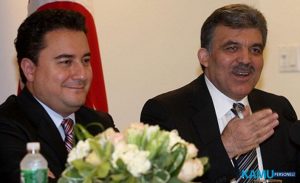
Ali Babacan and Abdullah Gül
The second political party initiative within the AK Parti is originated from Turkey’s former Minister of Economy Mr. Ali Babacan. Previous President of the Republic Mr. Abdullah Gül also supports Babacan and guides him closely according to many sources. Ali Babacan (52) was known as the most liberal and “occidentalist” figure within the Turkish Islamist movement. He was educated in METU and went to the US on Fulbright Scholarship to make his postgraduate studies. In 1992, he received MBA degree from the Kellogg School of Management at Northwestern University with majors in marketing, organizational behavior and international business. He then worked for two years as an associate at QRM, Inc. in Chicago, Illinois, a major financial consulting company in the US. He returned to Turkey in 1994 and served as chief advisor to the mayor of Ankara. He was the chairman of his family owned textile company between 1994 and 2002. He became Turkey’s Minister of Economic Affairs in 2002. For many analysts, he did a very good job in implementing IMF and Kemal Derviş’s plan to save Turkish economy after the huge 2001 economic crisis. Turkish economy boomed during this period. He also worked as Turkey’s chief negotiator (başmüzakereci) for Turkish accession to the European Union between 2005 and 2009. He was praised as a sympathetic and polite person and was resembled to Turkey’s former Prime Minister Adnan Menderes (1950-1960) because of his physical appearance. Later, he became the Minister of Foreign Affairs during the 2007-2009 period by replacing Abdullah Gül who was elected Turkey’s 11th President of the Republic. Babacan became once again the chief of Turkish economy between 2009 and 2015 as Turkey’s Deputy Prime Minister responsible for the economy. Turkish economy performed very well during this period according to official statistics concerning GDP growth rate, inflation and employment.
After 2015, he began to criticize the authoritarian orientation of the government and gradually distanced himself from Erdoğan and AK Parti. His outer position within the AK Parti coincided with Turkey’s economic regression after 2015 and increased his reputation as a successful statesman. He always stayed close to Abdullah Gül and international finance circles. In July 2019, few days ago, he resigned from AK Parti and began to work for establishing a new political party.[11] BBC claims that he will start a new liberal-conservative political party in this fall.[12] According to Abdülkadir Selvi, a Turkish journalist close to governing party and its elite, Babacan now feels like his “Macron moment” approaches after witnessing the success of CHP’s young Istanbul mayor Ekrem İmamoğlu.[13] In addition, Talat Atilla from Milliyet claims that, in case Abdullah Gül and Ali Babacan set up a new political party, 55 of current AK Parti deputies might join this party.[14] This might be an exaggerated guess; but this is certain: Gül and Babacan have more support within the AK Parti compared to Davutoğlu and there will be many deputies supporting this duo in case they start a new political party. It seems like Gül-Babacan duo can take more support from international financial and political circles as well due to their liberal and pro-Western stance.
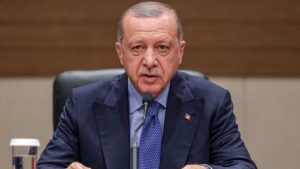
President Erdoğan does not think these new party initiatives will be risky for his power
Watching these developments posing -at least- potential risks to his power, President Erdoğan makes some warnings. Most recently, by referring to the party initiatives of Davutoğlu, Gül and Babacan, he said “you don’t have right to divide the umma”[15]. However, President Erdoğan still seems confident and he thinks that he can manage this process by using his governmental power as well as his personal charisma and legitimacy in the eyes of Turkish Islamists.
Finally, although new political party initiatives (especially that of Gül and Babacan) have great potential, it should not be forgotten that Turkey’s loyal right-wing voters change their preferences rarely. So, unless the governing AK Parti begins to give impressions of a breakdown, Turkish voters might not immediately prefer one of these new parties instead of AK Parti. Moreover, if these two separate initiatives will be somehow unified, Babacan, Gül and Davutoğlu (right-wing opposition in Turkey) will definitely have more chances against Erdoğan. Lastly, all of these three important political figures make reference to Turkey’s former parliamentary system that produced serious problems including three major coups (1960, 1971, 1980) and many economic crises (1994, 1999, 2001). It is a fact that Turkey’s current Executive Presidential system is not the best example of democracy, but returning back to old parliamentary system might not be that reasonable or appealing for Turkish people. Thus, advocating a democratic Presidentialism like that of the United States or a semi-Presidentialism like the French political system might be a better political rhetoric for the opposition. That is because Turkish society is very young and Turkish people always support new and untried alternatives in times of crisis.
Dr. Ozan ÖRMECİ
[1] https://www.reuters.com/article/us-turkey-economy-poll/turkeys-economy-to-contract-in-2019-longer-recession-ahead-idUSKCN1RO19Y.
[2] http://politikaakademisi.org/2018/06/24/erdogans-decisive-victory/.
[3] http://politikaakademisi.org/2019/04/02/turkeys-2019-local-elections-ak-parti-lost-three-big-cities/.
[4] http://politikaakademisi.org/2019/06/23/chps-ekrem-imamoglu-is-elected-istanbuls-new-municipal-leader-again/.
[5] https://balkaninsight.com/2011/04/26/davutoglu-i-m-not-a-neo-ottoman/.
[6] https://www.economist.com/europe/2007/11/15/an-eminence-grise.
[7] https://www.bbc.com/turkce/haberler/2014/04/140423_erdogan_1915_aciklama.
[8] https://medyascope.tv/2019/04/22/ahmet-davutoglundan-15-sayfalik-manifesto-cumhurbaskaninin-siyasi-parti-lideri-olmasi-sakincalidir/.
[9] https://www.amerikaninsesi.com/a/davutoglundan-akpye-sert-elestiri/4885981.html ; https://www.bbc.com/turkce/haberler-turkiye-48148636.
[10] https://www.bbc.com/turkce/haberler-turkiye-48816565.
[11] https://t24.com.tr/haber/ali-babacan-kurucusu-oldugu-akp-den-istifa-etti,829603.
[12] https://www.bbc.com/turkce/haberler-turkiye-48784162.
[13] https://tr.sputniknews.com/amp/turkiye/201906031039229580-selvi-imamoglunun-basarisinin-ali-babacani-umutlandirdigi-soyleniyor/.
[14] http://www.milliyet.com.tr/yazarlar/talat-atilla/gul-beni-partiye-almiyorlar-dip-dalgasiyla-55-vekili-isaretledi-2795949.


